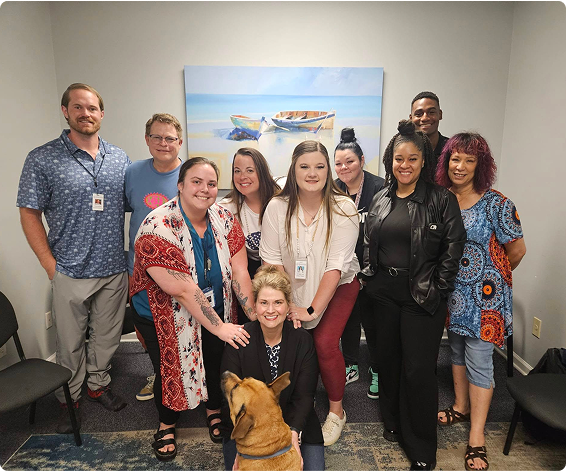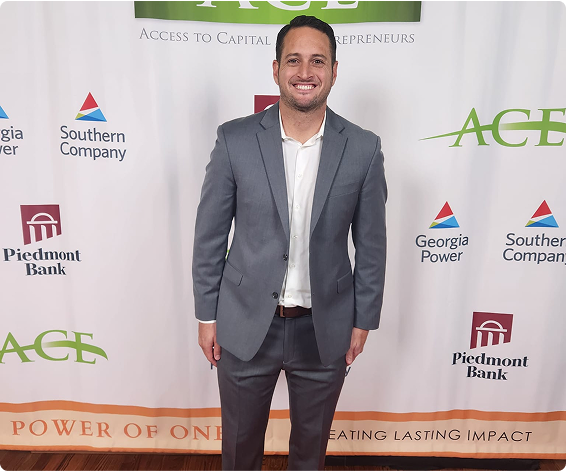Trauma can leave lasting emotional scars, affecting your thoughts, behaviors, and daily life. Our EMDR therapy in Atlanta helps you process painful memories and reduce their impact. Through this evidence-based approach, you can reframe past experiences, heal emotional wounds, and regain control of your life.

Trauma can leave lasting emotional scars, affecting your thoughts, behaviors, and daily life. Our EMDR therapy in Atlanta helps you process painful memories and reduce their impact. Through this evidence-based approach, you can reframe past experiences, heal emotional wounds, and regain control of your life.

EMDR (Eye Movement Desensitization and Reprocessing) is a highly effective therapy for trauma, PTSD, anxiety, and other emotional challenges. Our EMDR therapy in Atlanta starts with a personalized assessment to understand your experiences and develop a treatment plan that meets your needs.
Through guided eye movements and structured therapy sessions, EMDR helps your brain reprocess distressing memories, allowing you to heal without being overwhelmed by past trauma.
Clients in our Atlanta EMDR therapy program often experience significant emotional relief, improved coping skills, and a renewed sense of inner peace. Ready to take the next step?






EMDR is backed by research and widely recognized as one of the most effective treatments for trauma and PTSD.

Unlike traditional talk therapy, EMDR allows you to process trauma at a manageable pace, reducing emotional distress along the way.

EMDR doesn’t just treat symptoms—it helps you reframe past experiences, giving you the freedom to move forward with confidence.

It’s much more effective to get support. Our experts help you get back on your feet and moving forward in life.

When we’re only focused on our next fix, we lose track of who we really are. And we become people we never wanted to be. A good PHP helps you find yourself again.

Battling a mental health disorder (or more than one) and an addiction is near impossible without support. Let our experts guide you through.
EMDR therapy is designed to target deep-seated trauma, helping you process and heal in a structured, supportive way.
EMDR therapy is designed to target deep-seated trauma, helping you process and heal in a structured, supportive way.

Whether you're dealing with PTSD, childhood trauma, or emotional distress, EMDR provides a path to relief and recovery.

Whether you're dealing with PTSD, childhood trauma, or emotional distress, EMDR provides a path to relief and recovery.

EMDR helps you release the weight of the past, build emotional resilience, and create a more balanced, fulfilling future.

EMDR helps you release the weight of the past, build emotional resilience, and create a more balanced, fulfilling future.
How can our Atlanta EMDR Therapy help you?

Learn to manage stress with mindfulness, breathing, exercise, and more.

Get help building a routine that works for your life and recovery.

Our alumni love us, and you will too. We have 67 five-star reviews (and growing).

We accept major insurances. And we have self-pay and other options. Just ask!

You’ll benefit from our staff’s specialized trainings and support for combat PTSD.

Learn to manage stress with mindfulness, breathing, exercise, and more.

Get help building a routine that works for your life and recovery.

Our alumni love us, and you will too. We have 67 five-star reviews (and growing).

We accept major insurance carriers. And if you’re inclined, we have self-pay and other options. Just ask our admissions staff!

You’ll benefit from our staff’s specialized trainings and support for veterans. We understand what you’ve experienced, and can help you process it for good and leave it in the past.
WHO WE ARE

Having experienced both addiction and recovery himself, Jeff Baucom is a great advocate for others who struggle to become sober.
Jeff believes every person deserves sobriety, no matter what caused them pain and addiction in the first place.
Emily grew up in a variety of places across the United States and moved to Georgia in 2021. She holds multiple degrees including a Master of Social Work from the University of Louisville.
Emily believes in providing Evidence Based Interventions and brings excitement, passion, and empathy to every interaction.

How can our friendly staff help you?

The best way to achieve lasting recovery is deep healing. We guide you through what needs healing.

We’re your partner and guide, every step of the way. With that level of support, recovery is more likely.

There is strength in your journey. You’ve gotten this far. Now let’s take it all the way. Rely on your strengths as much as ours.

Call it accountability, “tough love,” or whatever you like: We hold you to a higher standard. You have potential to realize.
No recovery is complete without aftercare planning and support. Our Alumni program helps you stick to sobriety for good.

Join our PHP and get support that fits your schedule. We specialize in helping busy adults get the support they need.

The best way to achieve lasting recovery is deep healing. We guide you to what needs to be healed, and help you through it.

We’re your partner and guide, every step of the way. With that level of support, recovery is more likely.

There is strength in your journey. You’ve gotten this far. Now let’s take it all the way. We rely on your strengths as much as ours.

Call it accountability, “tough love,” or whatever you like: We hold you to a higher standard. We see your potential and help you realize it.
No recovery is complete without aftercare planning and support. Our Alumni program helps you stick to sobriety for good.

Join our PHP and get support that fits your schedule. We specialize in helping busy adults get the support they need.

For over 20 years, Bryan was a “functional addict.” Inner Voyage helped him build sober community and recover his true self. Bryan credits IVRC’s team for guiding him in the right direction.


For over 20 years, Bryan was a “functional addict.” Inner Voyage helped him build sober community and recover his true self. Bryan credits IVRC’s team for guiding him in the right direction.

For over 20 years, Bryan was a “functional addict.” Inner Voyage helped him build sober community and recover his true self. Bryan credits IVRC’s team for guiding him in the right direction.

A “functional Kratom addict for almost a decade,” Chris felt like a prisoner in his own skin. IVRC’s program helped Chris maintain accountability and build a healthy routine.

For over 20 years, Bryan was a “functional addict.” Inner Voyage helped him build sober community and recover his true self. Bryan credits IVRC’s team for guiding him in the right direction.

Every treatment will be uniquely tailored to you, because you’re unique.

Our team is 100% sober, including from Alcohol. We help our clients achieve sobriety and stick to it through thick and thin, because sobriety is the foundation of a fulfilling life.

Our team goes the extra mile. We’re the same people in public and private - hardworking, caring, and empathetic. We believe in doing the right thing, even when no one is looking.

People often comment on our warm and welcoming environment. Our staff wakes up excited to bring you into the fold. Recovery is where you belong.

You have limitless potential inside of you, waiting to be unleashed. Our staff sees who you can be - sober, fulfilled, and connected with others - and works to make it a reality.
How it all began…
CEO Jeff Baucom, after overcoming his own struggles with addiction, decides to give back to his community. IVRC is born with a mission to help thousands achieve detox and recovery, and live meaningful, sober lives.


Through hardwork, patience, grit, and perseverance, IVRC starts to get recognized as a leading detox center in Atlanta. Successful recoveries begin to accumulate and number in the hundreds, meaning thousands of lives impacted.
During the COVID-19 pandemic, addiction began to rise in Georgia (and around the world). IVRC did it’s part in helping Atlantans achieve sobriety and impacted hundreds more Atlantans, their families, and their communities.


Five years into this journey, and we’ve impacted hundreds of people who used to struggle with addiction, thousands of family members who love them, and tens of thousands of Atlantans who interact with them. Achieving recovery and sobriety reverberates throughout our society and culture, and we’re proud to lead the effort for a sober Georgia.

Discover why our programs are top rated today. Talk with our admissions team about the right treatment plan to bring lasting recovery.

When you call our professional and friendly admissions team, they will help you discover which program may be right for you. We have 10 programs that can help including inpatient, outpatient, and detox.

We accept most major insurance. In case yours is not, we offer payment plans and other ways to afford services. We want to help you!

You’ll receive a warm welcome at our Atlanta Detox Facility. Our recovery staff will get you set up in your dorm, show you the facility grounds and amenities, and get you integrated into your therapy and peer support groups.

Now that you’re in our program, the real work of recovery begins. You’ll be assisted with detoxing, healing pain and trauma, and overcoming shame and stigma. Our goal is to help you rehabilitate yourself so you can live a meaningful, connected, sober life.
When you call our professional and friendly admissions team, they will help you discover which program may be right for you. We have 10 programs that can help including inpatient, outpatient, and detox.

We accept most major insurance. In case yours is not, we offer payment plans and other ways to afford services. We want to help you!

You’ll receive a warm welcome at our Atlanta Detox Facility. Our recovery staff will get you set up in your dorm, show you the facility grounds and amenities, and get you integrated into your therapy and peer support groups.

Now that you’re in our program, the real work of recovery begins. You’ll be assisted with detoxing, healing pain and trauma, and overcoming shame and stigma. Our goal is to help you rehabilitate yourself so you can live a meaningful, connected, sober life.
Our Programs
A good recovery program is flexible. When you join IVRC, you’ll get a unique recovery plan that’s tailored to you and your life experience.
We know that choosing an intensive outpatient program to join isn’t an easy choice. There are many decisions to be made, and we want you to know that you are not in this alone. Browse our FAQ to find clarity.
Yes, you are. It’s called the FMLA. It’s a Federal law that protects employees during periods considered Mental Health Crises and a drug addiction fall under that.
At Inner Voyage Recovery, our rehab programs have a minimum of a 30 day stay, however, dependent upon clinical appropriateness most clients stay between three to six months. The length of stay is on a case-by-case basis.
The team at Inner Voyage truly believes that everyone belongs. Our highest priority is creating a kind, caring, and compassionate environment where you feel connected and safe. We want to develop a real relationship with you and we want you to develop real relationships with those around you. We provide a place to be you with no judgment while giving you the tools and knowledge you need to cope with your recovery long-term. We start small, one step at a time, and guide you through the recovery process.
Typically, our Partial Hospitalization Program lasts from 9:30 AM to 2 PM, and is a full day of treatment consisting of group therapy, individual therapy, medication management, family therapy, and more. Our Intensive Outpatient Programming is a half-day of treatment.
You don’t have to know which program will be best for you—that’s what we’re here for. We provide custom-tailored treatment plans for each individual that walks through our door. We monitor your progress through our program and will adjust your treatment plan accordingly as you progress. Our goal is to see you succeed in recovery and we tailor your plan around that goal.